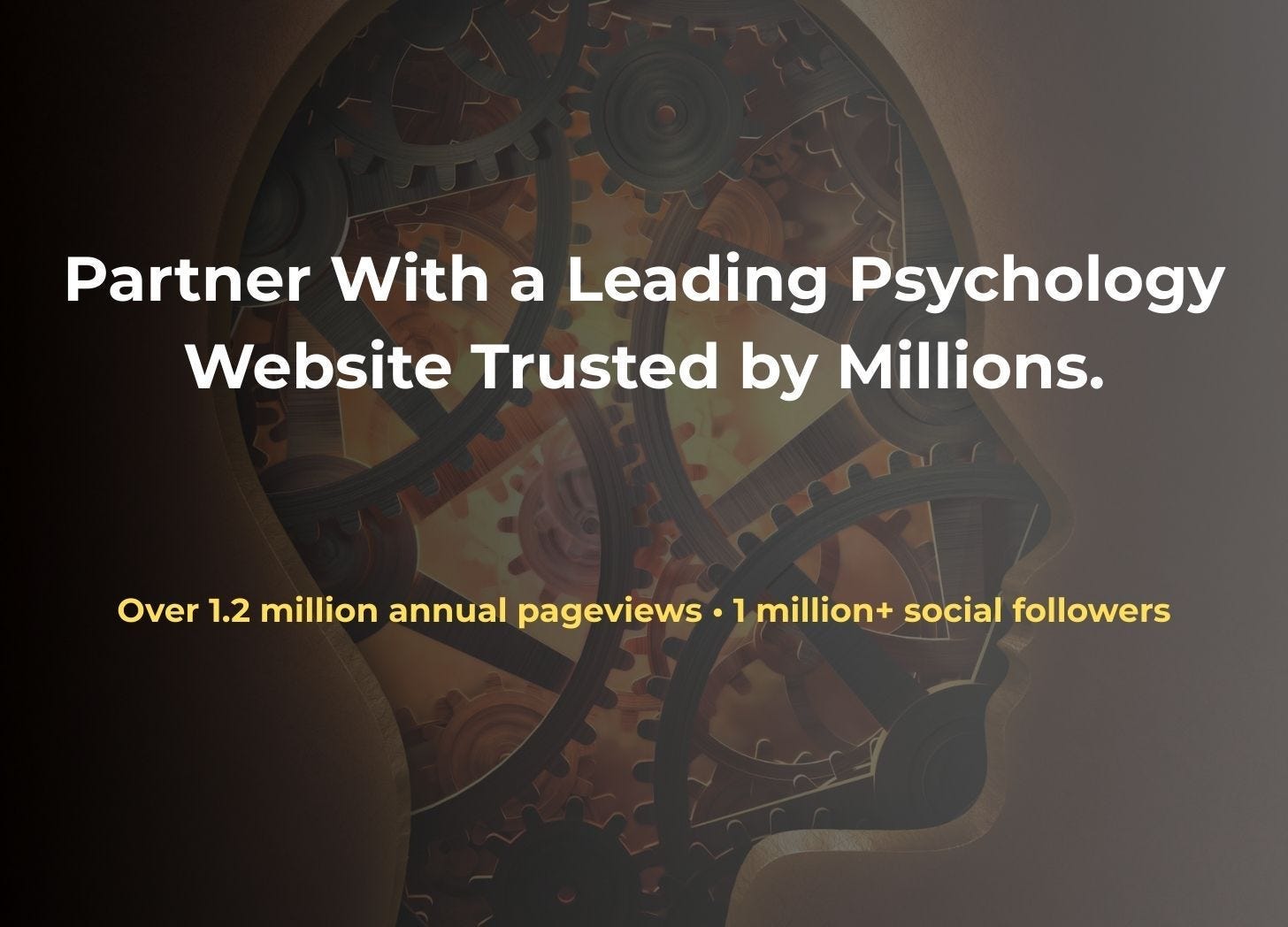Why We Get Bored (and Why Being Called Boring Hurts So Much)
A psychological look at boredom, the “boring person” label, and how this much-maligned emotion can sometimes work to our advantage.
I often feel bored and as an introvert, I strongly suspect that other people see me as boring. This undercurrent of self-awareness led me to explore boredom, not just as a passing feeling but as a complex psychological state and a socially loaded label.
What Boredom Really Is
Dr. John Eastwood, a leading boredom researcher (check out his Boredom Lab), calls it an “unengaged mind.” Essentially, you want to be stimulated but cannot connect meaningfully with what is in front of you.
Another leading boredom researcher, Erin Westgate, puts it this way: boredom is what happens when what you are doing is either too easy, too hard, or perhaps most corrosively, lacking in purpose.
This is what makes boredom such an odd companion. You can feel it during a long wait at the airport, halfway through a task you could do in your sleep, or even in the middle of a glittering social event that is just not doing it for you.
Here is an engaging answer to the question “What is boredom?” by Professor Davood Gozli.
Why We Get Bored
Boredom visits all of us, but it doesn’t treat everyone equally. It’s more likely to appear when there is a mismatch between your mental resources and the demands of the situation. Tasks that are too simple leave a gap between what you are doing and what you could be doing. Tasks that are too difficult overwhelm your attention.
Other risk factors include:
Attention problems – Conditions like ADHD make sustained focus harder, which in turn makes boredom more likely.
Sensation-seeking personalities – If you regularly crave novelty and reward, the world can feel like it is moving too slowly.
Alexithymia – Difficulty identifying your emotions can leave you without a compass for meaningful engagement.
Modern overstimulation – A constant diet of notifications and novelty can dull your ability to self-generate interest, making you more vulnerable to boredom when stimulation dips.
The Consequences: Negative and Positive
We often focus on the downsides of boredom, but research shows it can also lead to valuable and unexpected benefits.
The Downsides
Performance dips – Boredom reduces concentration and increases errors, sometimes in high-stakes settings.
Risky decisions – From reckless gambling to overeating, boredom can drive us toward quick, maladaptive fixes.
Mental health strain – Chronic boredom correlates strongly with depression and anxiety. Some studies even link high boredom levels to higher mortality risk, though that likely reflects broader disengagement from life.
Escape at any cost – In one infamous experiment, people chose to give themselves mild electric shocks rather than sit quietly with their thoughts. While this is often seen as evidence of how much we dislike boredom, it could also reflect a desire to silence an uncomfortable inner voice.
The Upsides
Creative breakthroughs – Boredom can push the mind toward novel connections and ideas. Many creative professionals credit it as a spark (pun intended), most notably Mary Shelley’s boredom-inducing, dull, and rainy summer in 1816, which inspired her to write Frankenstein.
Search for meaning – Discomfort with the present moment can send us looking for more fulfilling work, relationships, and ways of living.
Behavioral reset – By making unrewarding situations intolerable, boredom nudges us toward better alternatives.
The Stigma of “Boring People”
Being bored is an internal state. Being seen as boring is another matter entirely, and it can carry a surprising social cost.
Research by Wijnand van Tilburg and colleagues shows that society holds a remarkably consistent and unflattering image of the “boring person.” They are imagined as having few or narrow interests, lacking humor, avoiding strong opinions, and complaining often. They are stereotyped as bad listeners, uncreative, and low in ambition. Certain professions, such as accounting, data analysis, tax and insurance work, banking, and cleaning, are frequently labelled dull, regardless of how vital they are to society. Even hobbies are not spared: sleeping, watching TV, religion, mathematics, and birdwatching all rank near the bottom of the excitement scale.
The perception is not just negative, it is costly. In experiments, people said they would avoid socializing with such individuals and even required financial compensation to spend time with them. What is unusual here is that boring people are rated low in both warmth (friendliness, trustworthiness) and competence (capability, intelligence). Most social stereotypes grant at least one of these qualities, but boringness is perceived as a double deficit.
That combination can quietly undermine friendships, romantic opportunities, and workplace rapport, leading to social ostracism and, in some cases, loneliness. And yet, these stereotypes can be wildly inaccurate. Many so-called boring people live rich, fulfilling, and socially vibrant lives, indicating that the label says more about our cultural biases than it does about the person themselves.
Making Boredom Work for You
Because boredom is a signal, the key is to listen to it.
Find the meaning – Frame even mundane tasks within a larger purpose. Filing spreadsheets feels different if you see it as protecting your clients’ livelihoods.
Adjust the challenge – If something is too easy, add complexity. If it is too hard, break it into smaller steps.
Alternate your workload – Switch between more engaging and more tedious tasks to prevent spillover fatigue.
Channel the discomfort – Let boredom prompt you to explore a new skill, revisit an old hobby, or connect with people you have been meaning to see.
Reframe self-perception – If you worry about being boring, odds are you are already more engaging than you think. The self-awareness alone is a good sign. Clearly, I am hoping this applies to me!
Final Thoughts
Boredom isn’t a defect, it’s part of the human operating system. Like pain, it warns us that something isn’t right, urging us to adjust course. Left unaddressed, it can corrode focus, decision-making, and well-being. But when understood and used deliberately, boredom can be the starting point for creativity, curiosity, and meaningful change.
The next time boredom taps me on the shoulder, rather than just accepting it at face value, I’m going to try and work out what it’s trying to tell me. I suggest you do the same, The answer might be more interesting than you expect.
“The cure for boredom is curiosity, there is no cure for curiosity” (Ellen Parr)
I would love to hear how you experience boredom, and whether you see it as a problem to solve or a signal worth listening to.
Cheers,
David Webb (Connect with me on LinkedIn)
Founder, All-About-Psychology.com
Author | Psychology Educator | Psychology Content Marketing Specialist
🚀 Want to get your brand, book, course, newsletter or podcast in front of a highly engaged psychology audience? I can help.
All-About-Psychology.com offers advertising and sponsorship opportunities across one of the web’s most trusted psychology platforms - visited over 1.2 million times a year and supported by over 1 million social followers.
Whether you're an author, educator, startup, or organization in the psychology, mental health, or self-help space - this is your chance to stand out.
🎯 Exclusive placement
🔗 High-authority backlink
👀 A niche audience that actually cares
Learn more and explore advertising and sponsorship options here:
👉 www.all-about-psychology.com/psychology-advertising.html
Stay in the know! The All About Psychology newsletter is your go-to source for all things psychology. Subscribe today and instantly receive my bestselling Psychology Student Guide right in your inbox.
Upgrade to a paid subscription and also get the eBook version of my latest book Psychology Q & A: Great Answers to Fascinating Psychology Questions. As a paid subscriber, your support for the All About Psychology platform will help ensure that:
Psychology students and educators continue to have completely free access to the most important and influential journal articles ever published in the history of psychology.
Psychology students and educators continue to hear from world renowned psychologists and experts.
Free quality content and resources for psychology students and educators will continue to be created on a regular basis.





Really sorry to disappoint but I found your article fascinating <3
مشكور استاذ للمعلومات القيمة صراحة مقال اقل مايقالفيعه روعة ٠!!